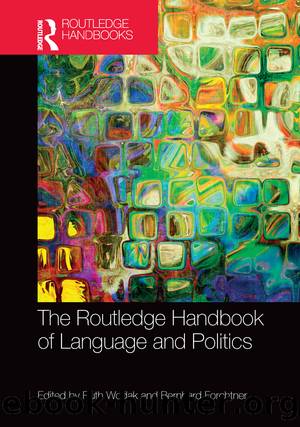The Routledge Handbook of Language and Politics by Wodak Ruth;Forchtner Bernhard;

Author:Wodak, Ruth;Forchtner, Bernhard;
Language: eng
Format: epub
ISBN: 9781351728966
Publisher: Taylor & Francis (CAM)
23
Policy-making
Documents and laws
Kristof Savski
* * *
Introduction
In this chapter, I see policies and laws as located at the intersection of two major fields, whose social practices, discourse and unique organisation (Bourdieu 1984) define the textual genres that constitute them (cf. Bhatia 2004). Many of these practices, actors and communities are linked to politics, a fluid field oriented towards shaping the exercise of state power, but whose boundaries are routinely redrawn in public discourse (Jessop 2014). It is this close relation to politics that differentiates policy from law, which is ultimately a much more strictly bounded field with an established historical narrative, settings, actors and linguistic practices (e.g. Tiersma 1999). In the following, I discuss how the social roles of policy and law impact linguistic approaches to the texts or genres that constitute both those fields.
Fairclough understands a genre as ‘a relatively stable set of conventions that is associated with, and partly enacts, a socially ratified type of activity’ (Fairclough 1992, p. 126). Investigating genres can therefore be carried out from two perspectives: from the text itself, with a close linguistic analysis of the language choices made in it, or from the practices in which it is embedded (cf. Bhatia 2004). This chapter attempts to take both perspectives into account, and most importantly, to create links between them by showing the ways in which policies and legal texts reflect the practices of which they are products. The core of the chapter is therefore devoted to three interlocking key areas of investigation outlined in the following.
In the case of policies and laws, the activities or social practices that the texts reflect and enact are geared towards the exercise of power within a certain community: in order to achieve a certain set objective, policies and laws mandate or ban certain types of activities. Policies and laws are therefore intrinsically linked to organisational structure and hierarchy, and can be seen as an exercise of institutional power that is dependent on the trust of the members of the community where it is to be applied (see, e.g. Jenkins 2007). In the case of state policy, this, for example, refers to the pre-supposed universal acceptance of the state as acting in common interest and following general will (Jessop 1990, p. 341). One section of this chapter therefore focuses on how analysing the genres that constitute policy and law also involve analysing the organisation they are embedded in.
However, policies and laws are not only about ‘making rules’: from a discursive perspective, every policy or law codifies a particular construction of social reality, and the transformative goal as well as the projected means required to achieve that goal are part and parcel of this construction (Levinson, Sutton & Winstead 2009, p. 770). From this perspective, the making of policies and laws is also a site of constant tension between different world-views or ideologies, and has evolved as a set of practices to allow for this tension to be overcome in the search for consensus. The law or policy text,
Download
This site does not store any files on its server. We only index and link to content provided by other sites. Please contact the content providers to delete copyright contents if any and email us, we'll remove relevant links or contents immediately.
Cecilia; Or, Memoirs of an Heiress — Volume 1 by Fanny Burney(31332)
Cecilia; Or, Memoirs of an Heiress — Volume 3 by Fanny Burney(30934)
Cecilia; Or, Memoirs of an Heiress — Volume 2 by Fanny Burney(30889)
The Lost Art of Listening by Michael P. Nichols(6472)
We Need to Talk by Celeste Headlee(4868)
Asking the Right Questions: A Guide to Critical Thinking by M. Neil Browne & Stuart M. Keeley(4574)
On Writing A Memoir of the Craft by Stephen King(4213)
Dialogue by Robert McKee(3582)
I Have Something to Say: Mastering the Art of Public Speaking in an Age of Disconnection by John Bowe(3516)
Pre-Suasion: A Revolutionary Way to Influence and Persuade by Robert Cialdini(3413)
Elements of Style 2017 by Richard De A'Morelli(2943)
The Book of Human Emotions by Tiffany Watt Smith(2770)
Good Humor, Bad Taste: A Sociology of the Joke by Kuipers Giselinde(2557)
Name Book, The: Over 10,000 Names--Their Meanings, Origins, and Spiritual Significance by Astoria Dorothy(2490)
Fluent Forever: How to Learn Any Language Fast and Never Forget It by Gabriel Wyner(2445)
The Grammaring Guide to English Grammar with Exercises by Péter Simon(2393)
Why I Write by George Orwell(2359)
The Art Of Deception by Kevin Mitnick(2297)
Don't Sleep, There Are Snakes by Daniel L. Everett(2216)
